Psychological concepts in phraseologisms of Russian language and their equivalents in German language
https://doi.org/10.26907/2658-3321.2022.5.3.325-337
Keywords:
psychological concepts, phraseologisms of the Russian language, representation, phraseologisms of the German languageAbstract
The article is devoted to the study of the representation of psychological concepts “attention”, “memory”, “perception”, “fantasy”, “speech”, “thinking”, “ability”, “knowledge”, “mind/mind/understanding”, “soul” in the phraseologisms of the Russian language and their equivalents (correspondences) in German. The material of the study was 88 phraseological units of the Russian language, 31 of which expressed the concept of “speech”, 11 – “attention”, 10 – “mind/mind/understanding” and “soul”, 6 – “thinking”, 5 – “memory”, “perception”, “ability”, 4 – “knowledge”, 1 – “fantasy”. The results of the study showed that the majority (about 60%) of all the phraseological units of the Russian language studied, representing psychological concepts, have equivalents in German, the remaining phraseologisms and idioms can be expressed in German by explaining and describing their meaning. It is noteworthy that for 45% of the phraseological units of the Russian language that verbalize the concept of “speech”, there are no equivalents in German, their meaning is conveyed by explaining the meaning. Unambiguous equivalents in German have most of the phraseologisms of the Russian language, representing the concepts of “thinking” and “memory”. The analysis confirmed the sufficient variety of phraseological representation of psychological concepts in Russian and German and its importance in both cultures. In the future, the studies carried out can be supplemented with a comparative study of the equivalence of phraseological units representing psychological concepts in Russian and English.
References
References
Baranov A.N., Dobrovolsky D.O. Aspects of phraseology theory. Moscow: Znak; 2008. (in Russ.)
Dobrovolsky D.O. National-cultural specificity in phraseology. Voprosy yazykoznaniya. 1997;(6):37–48. (in Russ.)
Telia V.N. On the specifics of displaying the world of psyche and knowledge in language. The essence, development and functions of the language. Moscow: Nauka; 1987. (in Russ.)
Ismagilova L.I. Representation of the emotional state of "fear" in Tatar phraseology. Sovremennye issledovaniya sotsial'nykh problem. 2020; 12 (5):169–177.
Fatkullina F.G., Kanafina A.R. Phraseological representation of the category of space in differ-ence-structured languages. Vestnik Bashkirskogo universiteta. 2020; 25(1):130–136. (in Russ.)
Yusupova L.G., Kuz'mina O.D., Kuznetsova I.I. (2019). Semantic features of phraseological units with an ornithonym component in English, German and Russian. Filologicheskie nauki. Vo-prosy teorii i praktiki. 2019;(6):242–245. (in Russ.)
Yusupova L.G., Kuz'mina O.D., Kuznetsova I.I. Substantive phraseological units in English and German. Filologicheskie nauki. Voprosy teorii i praktiki. 2019;(3):173–177. (in Russ.)
Yusupova L.G., Kuzmina O.D., Guseva M.I. Phraseological units with names of clothes in Eng-lish, German and Russian. Revista entrelinguas. 2021;7(3). Art. № e021054. DOI: https://doi.org/10.29051/el.v7iesp.3.15715 (in Engl.)
Vezhbitskaya A. (1996). Interpretation of emotional concepts. Language. Culture. Cognition. Moscow: Russkaya slovesnost'; 1996. (in Russ.)
Dubrovin M.I., Shenk V. (1982). Russian phraseologisms in pictures. Moscow: Russkii yazyk; 1982. (in Russ.)






